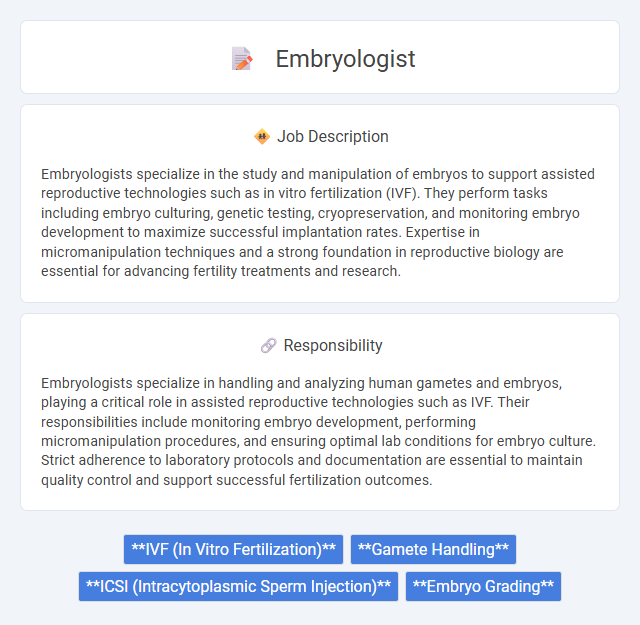
Embryologists specialize in the study and manipulation of embryos to support assisted reproductive technologies such as in vitro fertilization (IVF). They perform tasks including embryo culturing, genetic testing, cryopreservation, and monitoring embryo development to maximize successful implantation rates. Expertise in micromanipulation techniques and a strong foundation in reproductive biology are essential for advancing fertility treatments and research.
Individuals with strong analytical skills, patience, and attention to detail are likely to be well-suited for an embryologist role due to the precision required in handling delicate biological materials. Those who thrive in controlled laboratory environments and possess a passion for reproductive biology may find this career particularly fulfilling. Candidates who prefer fast-paced or highly social work settings may not find the embryologist profession as compatible with their strengths and preferences.
Qualification
An embryologist typically holds a bachelor's degree in biology, biomedical science, or a related field, with many positions requiring a master's or doctoral degree in embryology or reproductive biology. Professional certification from recognized bodies such as the American Board of Bioanalysis (ABB) or the European Society of Human Reproduction and Embryology (ESHRE) enhances career prospects. Practical experience in assisted reproductive technologies (ART), molecular biology techniques, and advanced microscopy is essential for qualified embryologists.
Responsibility
Embryologists specialize in handling and analyzing human gametes and embryos, playing a critical role in assisted reproductive technologies such as IVF. Their responsibilities include monitoring embryo development, performing micromanipulation procedures, and ensuring optimal lab conditions for embryo culture. Strict adherence to laboratory protocols and documentation are essential to maintain quality control and support successful fertilization outcomes.
Benefit
An embryologist may experience significant benefits such as contributing to successful fertility treatments and advancing reproductive technologies, which can be professionally fulfilling. The role potentially offers opportunities for research involvement, skill enhancement, and collaboration with medical experts, leading to career growth. There is also a probability of job stability and competitive compensation due to the specialized nature of the field.
Challenge
The role of an embryologist likely involves managing complex biological processes with precision, often under time-sensitive conditions that may introduce significant stress. Challenges may include ensuring the viability and quality of embryos while navigating the variability inherent in human reproduction. This job probably requires continuous adaptation to evolving technologies and maintaining meticulous attention to detail to maximize success rates.
Career Advancement
Embryologists play a critical role in assisted reproductive technology, with career advancement opportunities including senior embryologist, laboratory manager, and research scientist positions. Continuing education and certifications in reproductive biology enhance prospects for leadership roles within fertility clinics and laboratories. Expertise in innovative techniques like vitrification and genetic screening can further accelerate career growth and specialization in reproductive medicine.
Key Terms
IVF (In Vitro Fertilization)
Embryologists specializing in IVF (In Vitro Fertilization) play a critical role in assisting reproduction by handling gametes and embryos during the fertilization process. They perform procedures such as egg retrieval, sperm analysis, fertilization, embryo culture, grading, and cryopreservation, ensuring optimal conditions for embryo development. Expertise in micromanipulation techniques and maintaining sterile laboratory environments significantly contributes to successful IVF outcomes and increased pregnancy rates.
Gamete Handling
Embryologists specialize in gamete handling, which involves the precise collection, evaluation, and preparation of sperm and oocytes for assisted reproductive technologies such as in vitro fertilization (IVF). Mastery in maintaining optimal conditions during gamete cryopreservation and thawing is essential to preserve cellular viability and enhance fertilization outcomes. Expertise in micromanipulation techniques further improves fertilization rates and embryo quality, directly impacting successful pregnancy rates.
ICSI (Intracytoplasmic Sperm Injection)
Embryologists specializing in ICSI (Intracytoplasmic Sperm Injection) play a critical role in assisted reproductive technology by precisely injecting a single sperm directly into an egg to facilitate fertilization. Mastery of micromanipulation techniques and a deep understanding of embryonic development stages are essential for maximizing fertilization success rates and embryo quality. Expertise in ICSI contributes significantly to overcoming male infertility and improving outcomes in in vitro fertilization (IVF) cycles.
Embryo Grading
Embryo grading is a critical process in assisted reproductive technology where embryologists evaluate embryos based on morphology, cell number, and fragmentation to determine their viability for implantation. Accurate grading helps predict implantation success and increases the chances of achieving pregnancy by selecting the healthiest embryos. This expertise requires detailed knowledge of developmental biology and proficiency in using advanced microscopy techniques.
 kuljobs.com
kuljobs.com